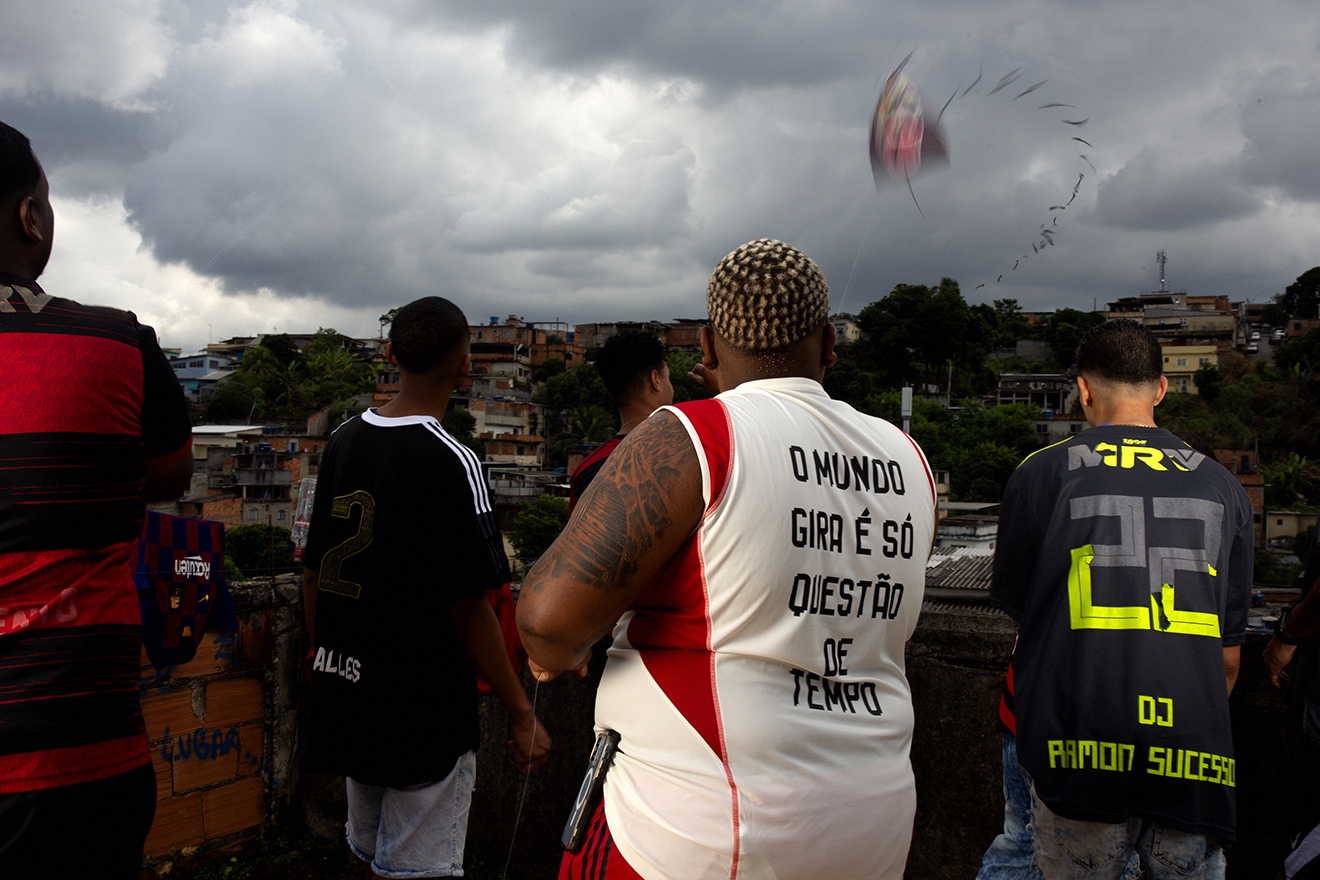 Features
Features
Get to know DJ Ramon Sucesso, the viral sensation shaking up Brazil's baile funk scene
Catching the attention of everyone from Arca to Neymar, DJ Ramon Sucesso has sent shockwaves through global dance music with his noisy, creative DJ videos. He speaks to Nathan Evans about his upbringing, signature style and new mixtape
DJ Ramon Sucesso was raised in Palhada, Nova Iguaçu, in the same house he lives in today. Located in the largest city of the Baixada Fluminense (a metropolitan region in the state of Rio de Janeiro), it’s a bustling neighbourhood where about three in every five households are playing music at any given moment and, when Ramon was younger, kids would fly kites out of their houses. From here, he’s managed to become a regular viral sensation online for his home DJing videos that push baile funk far beyond usual noise thresholds and somewhere into the Richter scale.
Ramon hates it in Palhada now. “It’s horrendous,” he says, slanted on his bedroom gaming chair. “There’s nothing here, and when there’s a party, there’s always fighting. You can’t even stand outside with your cell phone because you’ll be robbed.” According to a 2017 study, Nova Iguaçu has a rate of 1,055 robberies per 100,000 people in 2016, marginally higher than Rio de Janeiro as a state, but the impact of crime in the area’s baile funk scene is deeper than statistics. “A friend of mine was in a baile in the favela and a crossfire broke through between the police and locals,” he says. “People got killed during the baile, and nothing changed.”
Read this next: How sounds from the Global South stopped club culture stagnating
Despite the danger coming from police and locals, he finds plenty of room in our conversation over Zoom to express joy at his position right now. In a baile funk landscape where originality in one’s technique earns prominence, DJ Ramon Sucesso’s DJ clips have garnered a massive following online. Fans range from Venezuelan avant-club artist Arca and football superstar Neymar - “Some of Neymar’s friends in Furia commented on my most popular video, and I was really happy about that,” he smiles, revealing his braces. “Because if it reached them, it reached Neymar.” Though he is 21 years old, he’s already come a long way. “I’ve always wanted to find new forms of creativity,” he says. “I do things differently, and with a lot of training and focus I’m getting to where I always imagined.”
You’ll know a DJ Ramon Sucesso video when you see one. Stood at the decks wearing one of his many football shirts, he starts by juggling a single or multiple loops like he was DJ EZ, before launching into a distorted baile funk drop so almighty, the camera shakes as though there’s a rift in the spacetime continuum. Christened by fans of the Rio de Janeiro DJ as “Sexta dos Crias”, which translates to “Homie’s Friday”, these series of videos have run up incredible numbers on TikTok, Twitter and Instagram for the many different ways in which he produces more earthquaking low-end than the mind can comprehend (fans joke in the comments that “he distorts space and time itself”). In the process, he’s exposed an international audience to the more extreme sounds coming out of baile funk as well as its frenetic ‘bubble beat’ subgenre.

Ramon left school before finishing because, in his words, “I actually liked school, but I knew I was made for something else”. An early force in his musical career was DJ Denilson O Clínico. “I was listening to him and got more into music because of his mixes and productions,” he recalls. “We became friends and he started to teach me how to produce.” When he was 19, he bought a cheap laptop and DJ controller and started to balance live gigs with a job at a car wash and another handing out leaflets promoting politicians during local elections. Under Clínico’s tutelage, he began to focus on the severity of the beat and kick of his sound.
When it comes to live mixing, his main inspiration is Rio’s DJ Zullu, who claims to have “the fastest finger of fire” and whose live performances see him tapping the cue pads for breakneck chops as though he’s button mashing in a fighting game. Draw parallels to the Sexta dos Crias videos, and you’ll see how Ramon takes that party trick and runs with it to sample and create a new beat live with a controller. He plays with the pitch of a loop to make an alien-sounding rise, then flicks the wheel of the other track so it screams, releasing tension just before the breakdown.
Read this next: Desande is the dance music movement taking over the Brazilian mainstream
Ramon credits himself with popularising Beat Bolha, or “bubble beat”, a style that can be anywhere between 130 to 170 BPM and is defined by its squeaky wisps that hook in on the off-beat and make the beat feel even more hyperactive. Beat Bolha existed before Ramon and is one of the countless different rhythm patterns that fall under the baile funk umbrella, including Tamborzão, Tambor Xereca, Rasteirinha and Mandelão. “Funk goes through many trends, and different beats would catch the trend,” he explains. “But this was never the case with Beat Bolha, it never got popular.” Even Ramon didn’t like it initially, but he kept listening with interest. “I took it and reshaped it for my own purpose,” he says. “I started to layer Beat Bolha against Beat Bolha, which was something which hadn’t been done before. I made it more extreme.”

As much as fans like to joke, Ramon’s success is much more than that. The surprise distortion make Sexta dos Crias videos inherently memeable, but it has also been a gateway to a more experimental baile funk scene globally. Beyond Brazil, he’s become a mutually-adored figure connecting club music and experimental music circles across the Global North. The fascination that he’s cultivated over the last two years is reflective of baile funk’s continued rise, but also indicates a desire for rougher, redlining club music with a DIY aesthetic. “Brazil is living in 2050”, they say. Could this truly be the case, is this a sound of the future? With the noisier side of Baile funk only growing in scale on platforms like SoundCloud in a similar fashion to the scuzzy-sounding underground Jersey Club scene, it seems to be coming into fruition.
Read this next: 8 photos of Brazil's booming early-00s rave scene
But the signature character of the Sexta dos Crias videos didn’t appear at first, even when he was receiving notoriety. “When I had the first video that reached 100,000 views, I was in disbelief, ‘how was this happening?’” he remembers. “My brother who works with me said ‘let’s do another one!’”. Upon recording the follow-up, a happy accident led to the eureka moment. “He put the cell phone over the speaker and the phone started to shake. I didn’t like it at first, but my brother said, ‘no, you have to post it’.” Now, he leans into the unruliness, even when it comes to track selection. “I’m quite [particular] about searching for kick sounds and samples and frequencies that will create the distortion effect and tremble the camera and work with my speakers. I always try to find a new way to cut up the beat and use [different] frequencies.” Does he ever get noise complaints? “Never!” he exclaims. In a noisy neighbourhood, Ramon’s mixing has simply grown to be a part of his neighbourhood’s soundtrack.


Now, Brazilian label Lugar Alto is releasing a mixtape from DJ Ramon Sucesso, fittingly titled ‘Sexta dos Crias’. It’s a recording of what he does best brought to vinyl: revelling in heavily compressed bass hits that will make subwoofers out of laptop speakers, movement-oriented funk proibidão (literally meaning “prohibited funk” for their highly sexual nature) lyrics and Ramon himself on the mic shouting commands like “Obedecer! Obedecer!’ (which means ‘to listen’, but also ‘to obey’). Even aside from the frying bass, the way Ramon never stops editing and sampling and keeps momentum flying by cutting from one idea to the next immediately is addictive. Though you may hear certain tunes that have appeared in his videos, these newly mixed versions are chopped and played with in new ways. “We asked for several mixes, going back and forth trying to reach a point where some of it can be popular tracks but it’s not super huge while retaining that part of his sound,” explains Salvio De Queiroz and João Visconde, the label managers of Lugar Alto. Where side A is more likely to have montagems (the baile funk equivalent of edits) of more well-known tracks, side B’s title translates to “Distorting Reality”, and is a more blaring mix of original material from Ramon himself and his friends in the community around him.
Community is hugely important for Ramon, both locally and in the wider Rio funk scene. Rio is the birthplace of baile funk and has been evolving the genre for three decades, but in recent years, it has been subsided somewhat by São Paulo’s darker, techno-influenced scene that houses producers such as DJ R7, DJ K and DJ C4. Where Rio is a vastly more varied region which blends the original baile funk rhythms with sonic experimentation, São Paulo funk has achieved new levels of mainstream success for its funk ostentacão (translated as “ostentatious funk”) lyrics, electronic aesthetic and exploration of timbre. “São Paulo is more forward-thinking than Rio,” posits Ramon. “I see it as a result of São Paulo artists being more united.” It makes sense: MC João’s ‘Baile De Favela’, a São Paulo funk track about celebrating the collective joy of bailes, was the first funk music video to reach 100 million views on YouTube. “If Rio became more united, it would be at the top,” he adds.
As for Ramon, he aims to take care of his family with his recent success. Recently becoming a father has made an already down-to-earth person even more homebound. “I don’t smoke or drink at all, I go to church, I’m a Reformed Christian,” he says. “I’ve always been chill, but I got even more home-based. I have to make decisions with my son in mind.” When it comes to his career, he intends to take his notoriety beyond Sexta dos Crias. “I want to reach a global level of recognition. I look to [fellow Brazilian DJ] Alok, and I want to reach that level doing what I already do, and by not changing the essence of my vision of sound and music.” “What about a Ramon Sucesso x Anitta collab?” I ask about Brazil’s biggest pop star. “That would be a dream!” he laughs mischeviously.
‘Sexta dos Crias’ is out now via Lugar Alto, buy it here
Nathan Evans is a freelance music journalist, follow him on Twitter



